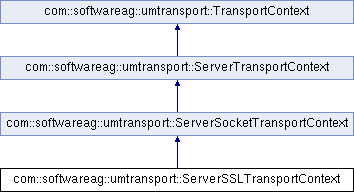- com
- softwareag
- umtransport
- ServerSSLTransportContext

Constructed using the ServerSSLTransportContext.Builder. All information must be set on the Builder so that when this object is built, it is validated. It is used to create Transport objects using TransportFactory.connect. Communication on the transport SSL encrypted and transmitted using Sockets. More...
#include <ServerSSLTransportContext.h>

Data Structures | |
| class | Builder |
| This Builder object is used to build a ServerSSLTransportContext. The ServerSSLTransportContext is configured using the builder so that once build() is called, the ServerSSLTransportContext is only returned if it is valid. You can use the Builder to create simple readable code like this: More... | |
Public Member Functions | |
| std::string | getEnabledCiphers () |
| Get the ciphers that will be enabled if supported by the SSL ServerTransport More... | |
| std::string | getKeyStore () |
| Get the location of the key store where the server certificate is stored, this the private key and certificate in PKCS#12 format for OpenSSL More... | |
| std::string | getKeyStorePassword () |
| Get the password that is used to access the key store, this is the private key in OpenSSL More... | |
| std::string | getTrustStore () |
| Get the location of the trust store that is used to validate certificates, this is the certificate in OpenSSL More... | |
| bool | isClientCertificateValidationRequired () |
| Used to determine whether or not the client is required to present a certificate More... | |
 Public Member Functions inherited from com::softwareag::umtransport::ServerSocketTransportContext Public Member Functions inherited from com::softwareag::umtransport::ServerSocketTransportContext | |
| std::string | getAdapter () |
| Returns the adapter that will be bound to by ServerTransports created using this ServerContext More... | |
| int | getPort () |
| Returns the port that will be used by ServerTransports created using this ServerContext More... | |
| int | getReadBufferSize () |
| Get the read buffer size in bytes that will be used by ServerTransports created using this ServerContext More... | |
| int | getWriteBufferSize () |
| Get the write buffer size in bytes that will be used by ServerTransports created using this ServerContext More... | |
| virtual bool | supportsAsync () |
| This ServerTransportContext supports Async which means that it can be used to create AsynchronousServerTransports using the TransportFactory.bind variant which takes callback objects. More... | |
Constructed using the ServerSSLTransportContext.Builder. All information must be set on the Builder so that when this object is built, it is validated. It is used to create Transport objects using TransportFactory.connect. Communication on the transport SSL encrypted and transmitted using Sockets.
| std::string com::softwareag::umtransport::ServerSSLTransportContext::getEnabledCiphers | ( | ) |
Get the ciphers that will be enabled if supported by the SSL ServerTransport
| std::string com::softwareag::umtransport::ServerSSLTransportContext::getKeyStore | ( | ) |
Get the location of the key store where the server certificate is stored, this the private key and certificate in PKCS#12 format for OpenSSL
| std::string com::softwareag::umtransport::ServerSSLTransportContext::getKeyStorePassword | ( | ) |
Get the password that is used to access the key store, this is the private key in OpenSSL
| std::string com::softwareag::umtransport::ServerSSLTransportContext::getTrustStore | ( | ) |
Get the location of the trust store that is used to validate certificates, this is the certificate in OpenSSL
| bool com::softwareag::umtransport::ServerSSLTransportContext::isClientCertificateValidationRequired | ( | ) |
Used to determine whether or not the client is required to present a certificate